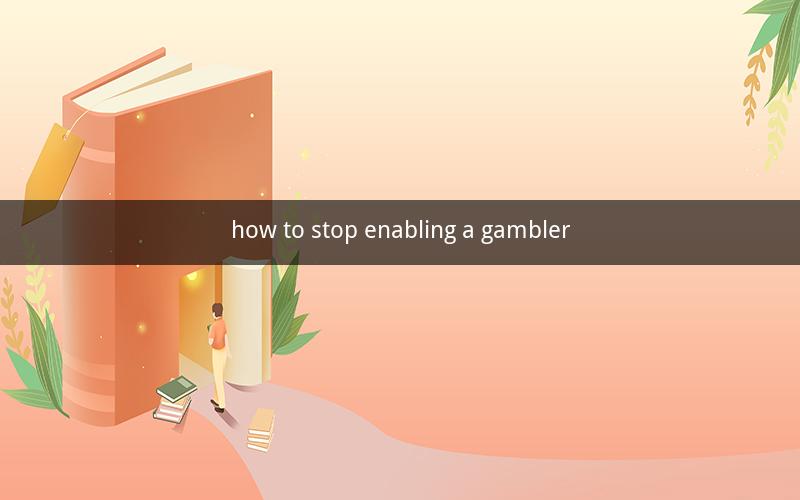
Table of Contents
1. Understanding Enabling Behavior
2. Recognizing the Signs of a Gambler
3. The Impact of Enabling on the Gambler
4. Communication Strategies
5. Setting Boundaries
6. Encouraging Professional Help
7. Support Systems
8. Self-Care for the Enabler
9. The Road to Recovery
10. Conclusion
---
1. Understanding Enabling Behavior
Enabling, in the context of gambling addiction, refers to the actions taken by friends or family members that actually reinforce and prolong the addictive behavior. This can include providing financial support, covering up for the gambler, or making excuses for them. Understanding why enabling occurs is crucial to addressing the issue.
2. Recognizing the Signs of a Gambler
Identifying a gambler's behaviors can help in determining whether enabling is taking place. Common signs include secretiveness, borrowing money frequently, spending excessive time gambling, and neglecting responsibilities.
3. The Impact of Enabling on the Gambler
Enabling can have severe consequences for the gambler. It can prevent them from acknowledging their problem, delaying or preventing them from seeking help, and perpetuating the cycle of addiction.
4. Communication Strategies
Constructive communication is key to breaking the enabling cycle. This involves expressing concern without being confrontational, using "I" statements, and listening actively to the gambler's perspective.
5. Setting Boundaries
Establishing clear boundaries is essential to prevent enabling. This may involve limiting financial support, setting time limits for visits to gambling venues, or even cutting off communication in extreme cases.
6. Encouraging Professional Help
Professional intervention can be highly effective in addressing gambling addiction. Encouraging the gambler to seek therapy, attend support groups, or undergo rehabilitation can be a significant step towards recovery.
7. Support Systems
Creating a support system can provide the gambler with a network of people who are invested in their recovery. This may include friends, family members, or support group participants.
8. Self-Care for the Enabler
Taking care of oneself is equally important. Enablers should engage in self-care activities, seek support from others, and recognize their own limits to prevent burnout.
9. The Road to Recovery
The road to recovery is a challenging but rewarding journey. It requires patience, persistence, and a willingness to adapt to change. With the right support and mindset, the gambler can overcome addiction.
---
10. Conclusion
Enabling a gambler can be detrimental to their recovery. By understanding the nature of enabling, recognizing the signs of a gambler, setting boundaries, encouraging professional help, and establishing a support system, friends and family members can play a crucial role in facilitating the gambler's path to recovery.
---
Questions and Answers
1. What is enabling in the context of gambling addiction?
- Enabling refers to the actions taken by friends or family members that reinforce and prolong the addictive behavior of a gambler.
2. How can I recognize the signs of a gambler?
- Signs include secretiveness, excessive gambling time, neglecting responsibilities, and borrowing money frequently.
3. What are the consequences of enabling a gambler?
- Enabling can delay or prevent the gambler from seeking help, perpetuate the cycle of addiction, and lead to financial and emotional consequences for the enabler.
4. What communication strategies can be effective in addressing enabling behavior?
- Use "I" statements to express concern, listen actively, and avoid confrontational language.
5. How can I set boundaries with a gambler?
- Limit financial support, set time limits for visits to gambling venues, and communicate clearly about the boundaries.
6. Why is it important to encourage professional help for a gambler?
- Professional intervention can be highly effective in addressing the addiction, providing support and strategies for recovery.
7. How can I create a support system for a gambler?
- Encourage them to join support groups, seek friends and family members for support, and find others who have overcome gambling addiction.
8. Why is self-care important for the enabler?
- Self-care can prevent burnout and emotional exhaustion, ensuring the enabler remains strong and capable of supporting the gambler.
9. What can I expect on the road to recovery for the gambler?
- It will be challenging but rewarding, requiring patience, persistence, and a willingness to adapt to change.
10. How can friends and family members help in the gambler's recovery?
- By understanding the nature of addiction, providing support, encouraging professional help, and maintaining clear boundaries.